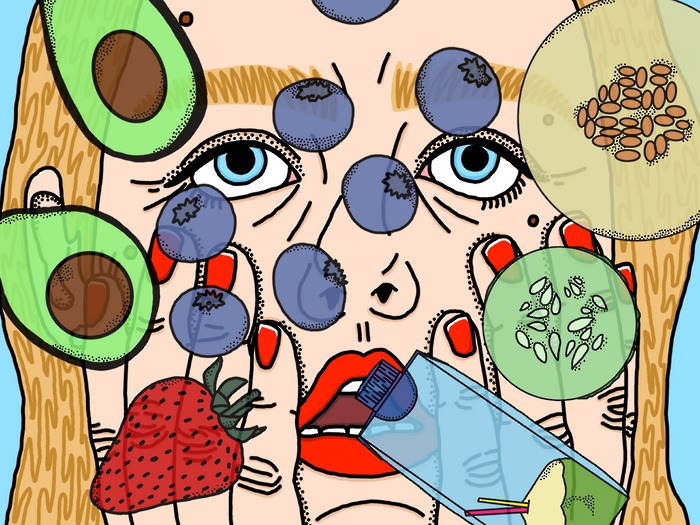Veganuary should only be taken on for the right reason
Millie Morgan argues that we need to encourage conversations about why people are adopting plant-based diets – and whether it’s for the right reason

Content Note: This article contains detailed discussion of eating disorders.
These days, more and more people are boycotting the meat and dairy industries and choosing to invest in more sustainably sourced, plant-based foods. According to the Cambridge University Vegan Society, in a recent email, there has been a three-fold increase in membership this year alone, indicating an increasing prevalence of veganism amongst our student community. But the environmental principles which are fundamental to a vegan lifestyle are somewhat overshadowed by the misconception that veganism is ‘more healthy’ than eating an animal-based diet.
According to the UK Vegan Society, “Veganism is a way of living which seeks to exclude, as far as is possible and practicable, all forms of exploitation of, and cruelty to, animals for food, clothing or any other purpose.” To a vegan, any health benefits they receive from abstaining from eating animal products are secondary to the environmental impact which they actively aim to create. By this definition, when people go ‘vegan’ to lose weight or improve their health, they are not becoming vegan at all, but simply adopting a plant-based diet.
The plant-based diet (often misleadingly referred to in the media as veganism) is perceived as healthy because fruit and vegetables are low in calories and high in nutrients. In contrast, meat and dairy are calorically dense and high in saturated fat, which can cause a rise in cholesterol and lead to an increased risk of heart disease and stroke.
The Netflix Documentary, The Game Changers, has convinced many meat-eaters to embark upon a ‘vegan diet’ by exploring the health benefits of eating plant-based. The documentary detailed miracle recoveries and career rejuvenations experienced by elite athletes which they attribute entirely to their conversion to veganism.
I do not doubt that some people are very well suited to a plant-based diet, but the documentary promotes a one-size-fits-all attitude towards diet in general which is unrealistic, and can be dangerous when those who are convinced to give the sensationalised diet a go are misinformed. The documentary does not make explicit what these elite vegan athletes are eating on their plant-based diet, and a lot of the vegan versus meat-eater experiments used to shock the viewers into veganism are self-disclaimed to be non-scientific.
It can be said that The Game Changers has been effective in broadening the appeal of a vegan lifestyle, especially to men, a demographic statistically reluctant to take up veganism (making up only 13% of Veganuary participants last year). This is perhaps due to the historical marketing of meat as an essential to any masculine diet, as discussed in the documentary. Any promotion of the vegan industry over the meat and dairy industries is surely beneficial to the environment, but it shouldn’t be the case that this benefit is a side effect of a misinformed health craze.
Despite what the media might try to project, veganism was not designed with health in mind, so it is no surprise that a plant-based diet can actually be quite damaging to one’s health, when not done properly. A deficiency in Vitamin B12, for example, can cause the production of abnormally large, dysfunctional red blood cells, leading to deprivation of oxygen in cells. Furthermore, particularly active individuals with a high metabolic rate may struggle to meet their daily caloric needs on foods with such low caloric density, without the professional guidance which is abundantly available to the elite athletes depicted in The Game Changers.
What’s most concerning is that the weight-loss attribute of a vegan lifestyle is perceived by many as its most attractive quality. Veganism is being used to disguise disordered eating as it allows individuals to cut out food groups which they perceive to be unhealthy, using ethical principles as an excuse. It is difficult to prove this empirically, since affected individuals are likely to deny these intentions, but many studies link higher engagement in ethical food consumption to increased orthorexic tendencies, particularly amongst female students. This is an issue we must address and discuss in order to keep ourselves - and our peers healthy.
Veganism should be a lifestyle motivated by morality, not a diet motivated by calorie restriction. While any endorsement into Veganism is hugely positive for the environment (and animal welfare), it should not be at the cost of anybody’s mental or physical health. It is preached by countless dieticians that those seeking a healthier diet and lifestyle should sooner add more variety in the form of nutrient dense fruits and vegetables than to avoid entire food groups, and should listen to their own body’s needs. We should appreciate and adhere to the way of eating works best for us as individuals.
 News / Eight Cambridge researchers awarded €17m in ERC research grants27 December 2025
News / Eight Cambridge researchers awarded €17m in ERC research grants27 December 2025 News / Downing investigates ‘mysterious’ underground burial vault 29 December 2025
News / Downing investigates ‘mysterious’ underground burial vault 29 December 2025 Lifestyle / Ask Auntie Alice29 December 2025
Lifestyle / Ask Auntie Alice29 December 2025 Sport / Hard work, heartbreak and hope: international gymnast Maddie Marshall’s journey 29 December 2025
Sport / Hard work, heartbreak and hope: international gymnast Maddie Marshall’s journey 29 December 2025 News / News in Brief: carols, card games, and canine calamities28 December 2025
News / News in Brief: carols, card games, and canine calamities28 December 2025







